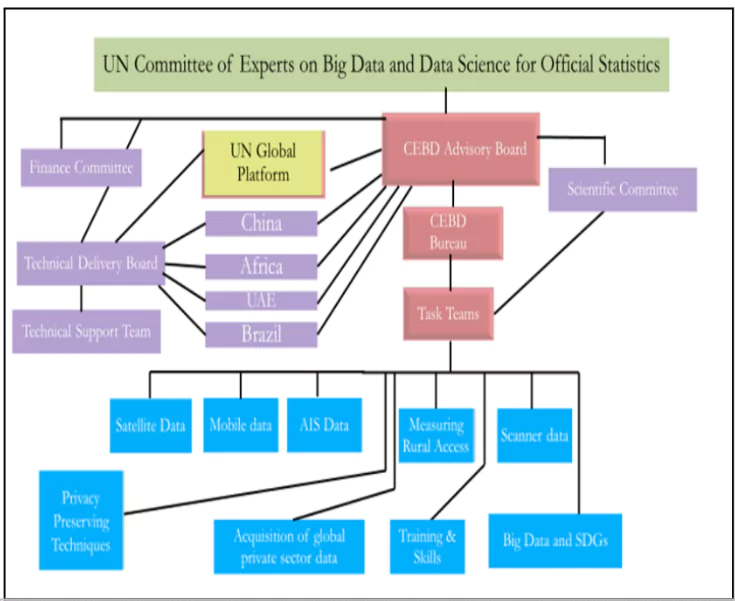India has become a member of the UN Committee of Experts on Big Data and Data Science for Official Statistics (UN-CEBD), signifying its growing influence in the global statistical community.
Highlights of India Joining UN-CEBD
- India’s Contribution: India will help shape global standards and practices for leveraging Big Data and data science in official statistics.
- The Ministry of Statistics and Programme Implementation (MOSPI) emphasized India’s role in promoting innovative solutions in data science.
- Focus Areas: This initiative highlights India’s commitment to utilizing data and technology for evidence-based decision-making and enhancing global statistical collaboration.
Enroll now for UPSC Online Classes
About UN Committee of Experts on Big Data and Data Science for Official Statistics (UN-CEBD)

- Origin: Established in 2014, with Australia as its first chair.
- Created to provide strategic vision and coordination for a global program on Big Data for official statistics.
- Aim : To offer a strategic direction for integrating Big Data into official statistical systems.
- Support the development of indicators for the 2030 Agenda for Sustainable Development.
- Membership: Comprises 31 member states and 16 international organizations, including India.
- Powers and Functions
- Integration of Big Data: Incorporate Big Data into national and international statistical systems.
- Utilize non-traditional data sources, such as IoT devices, satellite imagery, and private sector data.
- Capacity Building: Provide training for statisticians in data science techniques to enhance their skills.
- Framework Development: Establish frameworks for cross-border data sharing and promote ethical practices in data utilization.
- Purpose of UN-CEBD
- Explore the benefits and challenges of Big Data in official statistics.
- Play a crucial role in monitoring and reporting on Sustainable Development Goals (SDGs).
- Advocate for data-driven policymaking to address global challenges.
Significance of Joining for India
- Enhancing Statistical Capabilities: Modernize data processes by adopting IoT, satellite imagery, and private sector data sources.
- Global Collaboration: Share India’s innovations, such as the Data Innovation Lab, and adopt best practices from other nations.
- Improved Decision-Making: Enable real-time insights for policymakers to support evidence-based decisions.
- Address key socio-economic challenges effectively with advanced data tools.
About Big Data
- Definition: Big Data refers to collecting and analyzing vast amounts of structured, unstructured, and mixed data to uncover patterns, trends, and actionable insights.
- Types of Data:
- Structured Data: Organized data, such as inventory databases or financial transaction lists.
- Unstructured Data: Raw data, including social media posts or videos.
- Mixed Data Sets: Combination of structured and unstructured data, often used to train AI models like large language models.
Check Out UPSC NCERT Textbooks From PW Store
Applications of Big Data Analytics
- Governance: Enhances utility management, law enforcement, and education.
- Supports predictive analytics for risk mitigation, cyber-attack prevention, and disaster impact reduction.
- Economy: Applied in insurance, banking, taxation, and anti-money laundering.
- Improves customer service, risk management, financial analysis, and identifies tax evasion or shell companies.
- Healthcare: Enables personalized treatments, improves patient outcomes, and predicts disease outbreaks.
- Optimizes clinical trials and enhances hospital management and patient monitoring.
- Agriculture: Facilitates data-driven farming to improve crop yields and predict plant diseases.
- Optimizes supply chains, monitors livestock, and aids adaptation to climate change.
- Digital Space: Optimizes telecommunications and delivers personalized content.
- Powers AI-driven appliances and wearable technology to enhance performance.
- Defence: Strengthens cybersecurity and improves mission planning.
- Analyzes threats, supports weapon system development, and aids training through combat simulations.
- Space Technology: Monitors environmental changes and optimizes mission trajectories.
- Manages space debris, explores exoplanets, and ensures efficiency of life support systems.
![]() 14 Jan 2025
14 Jan 2025


